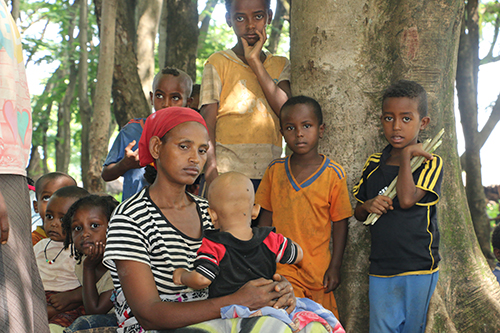Updates
With funding from Canada, sexual and gender-based violence programme in Ethiopia enters a new phase
31 May 2018
Updates
31 May 2018
A recent funding commitment from Canada will enable UNFPA in Ethiopia to continue its work to prevent and respond to sexual and gender-based violence and harmful traditional practices.
The five-year programme will target girls and women who are most vulnerable to sexual and gender-based violence – including adolescent girls, out-of-school girls, women and girls with disabilities, and survivors of violence. It will employ a three-pronged approach comprising prevention, service provision and protection.
Work with communities will raise awareness of sexual and gender-based violence and mobilize support for the rights of women and girls. The programme will tackle social norms that limit women’s control over their own bodies, while also engaging boys and men to promote gender equality and positive masculinity.
At the same time, UNFPA will work with partners to provide quality services, including safe houses, to help survivors of violence get the medical care, safety and counselling they need to recover from their experiences. Work with government institutions, law enforcement and NGOs will strengthen prevention and response, including through improved data, and support survivors in obtaining services, including justice support, to which they have a right.
Canada’s support for the programme, said Ms. Anouk St-Arnaud, First Secretary of Development with the Embassy of Canada in Ethiopia, is in line with country’s Feminist International Assistance Policy. The policy aims to advance the empowerment of women and girls to exercise their human rights, including their rights to sexual and reproductive health, free from violence, harmful traditional practices, exploitation and discrimination.
The new programme will be implemented in selected districts in all regions, including the city administrations of Addis Ababa and Dire Dawa. It will serve as the third phase of UNFPA’s work on prevention and management of gender-based violence in Ethiopia, following two previous phases implemented between 2008 and 2015.

The first two phases have had a powerful impact on the lives of women like Abebech Kabla. In her community, part of the Gumuz ethnic group of western Ethiopia, women in labour were seen as unclean and sent out to the bush to give birth alone. With no one to help should complications arise, they and their newborns faced high risks of disability and death.
After three lonely and harrowing births, Ms. Abebech was able to deliver her fourth child at home, with assistance. Advocacy and community engagement on harmful traditional practices and gender-based violence by the Mujejeguwa Loka Women’s Development Organization – which will continue as a UNFPA partner in the programme’s third phase – lent Ms. Abebech the support she needed to take a stand for herself and her baby.
“At first it was very challenging for the men to accept this, and the family was pointing fingers at me,” she recalled. But she stood her ground, and persevered – staying home to give birth to her fifth child as well.
At a meeting in April to announce the programme’s new phase, UNFPA Country Representative Bettina Maas emphasized that it will be instrumental in ending gender-based violence and harmful practices against women and girls – thereby furthering one of the transformative results of UNFPA’s Strategic Plan, Sustainable Development Goal 16 and, through the focus on disadvantaged groups, the 2030 Agenda imperative to leave no one behind.